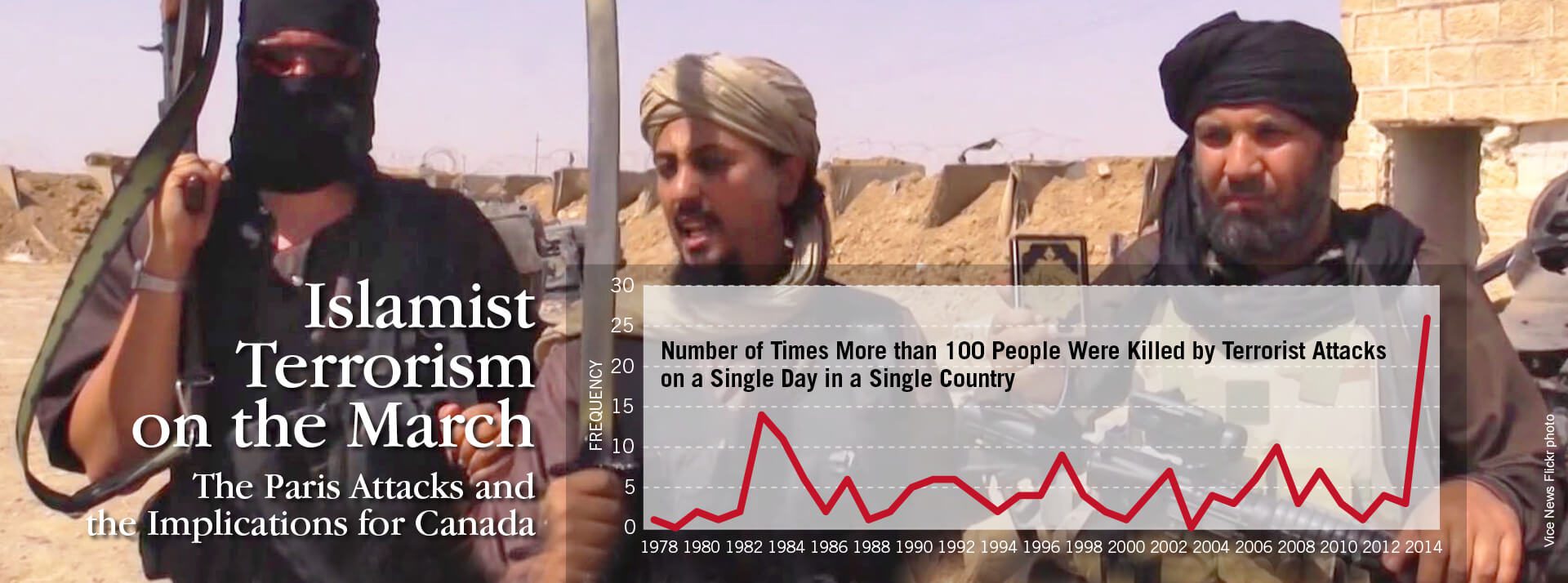 Bloody week part of a trend in global terrorism that challenges government policies on security preparedness, Iraq engagement and refugee resettlement
Bloody week part of a trend in global terrorism that challenges government policies on security preparedness, Iraq engagement and refugee resettlement
OTTAWA, Nov. 19, 2015 – The horrific terrorist attacks in Paris on Nov. 13 corroborate once again that Islamist terrorism is not in retreat. And this new reality creates challenges for Canada’s new government on security preparedness, it’s contribution to coalition forces in Iraq, and refugee resettlement.
Renowned international security expert Alex Wilner, in a new commentary for the Macdonald-Laurier Institute, analyses what’s next for Canada’s fight against ISIS after last week’s terrorist attacks on Paris.
In the new paper, titled “Islamist Terrorism on the March: The Paris Attacks and the Implications for Canada”, Wilner writes that mass casualty terrorist attacks have spiked dramatically in the last two years making Paris the “tip of a macabre iceberg”.
To read the full paper, click here.
While Canada has been largely successful so far at arresting, trying and jailing would-be Canadian terrorists, the worsening security environment demonstrates that “good intelligence and policing, robust defence and denial, and rapid first response are top of mind”, writes Wilner.
The situation also complicates the government’s plans to withdraw CF-18 fighters from the engagement in Iraq “at the exact moment when international consensus seems to be shifting the other way”, and immediately resettle 25,000 Syrian refugees.
Wilner says Canada’s allies won’t have a problem picking up the slack once the new Canadian government follows through on its election-campaign promise to end the bombing campaign against ISIS.
“The issue is how does Canada signal its intention to engage the global community on ISIS in other concrete and effective ways”, he writes.
Wilner offers several policy ideas:
- Maintain or increase the number of surveillance and refuelling aircraft committed to the anti-ISIS coalition;
- Redouble our efforts to train anti-ISIS forces in Jordan, Iraq, and elsewhere, as the government has committed to doing;
- Further our ongoing contribution to humanitarian assistance to the communities and countries in the region who need it.
Another concern, says Wilner, is the government’s commitment to bringing 25,000 refugees to Canada before the end of 2015.
Given the security issues – one of the Paris attackers travelled to Western Europe posing as a Syrian refugee – Wilner says it’s unclear if the government will be able to meet this worthy goal given the timeline.
“The question for today – in light of Paris and ISIS’s presumed ambitions, and in light of the magnitude of the refugee crisis in Europe – is whether or not Canada has dedicated itself too far and too fast”, writes Wilner.
***
Dr. Alex S. Wilner is an Assistant Professor of International Relations at the Norman Paterson School of International Affairs (NPSIA), Carleton University and a Senior Fellow at the Macdonald-Laurier Institute.
The Macdonald-Laurier Institute is the only non-partisan, independent national public policy think tank in Ottawa focusing on the full range of issues that fall under the jurisdiction of the federal government. Join us in 2015 as we celebrate our 5th anniversary.
For more information, please contact Mark Brownlee, communications manager, at 613-482-8327 x105 or email at mark.brownlee@macdonaldlaurier.ca.





